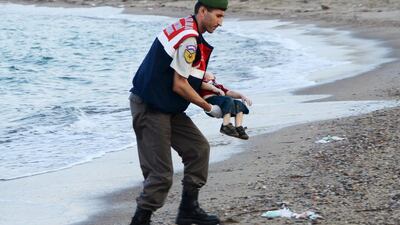Anyone who questions the ability of an image to change the course of public debate need only look at the photograph of a dead Syrian toddler who washed ashore on a beach on Turkey's Bodrum peninsula. The photograph of three-year-old Aylan Kurdi's body face down in the sand was too distressing to run in this newspaper but humanised the issue in a way that mere words struggle to match. It, and another image of the boy's lifeless body being carried from the scene by an emergency worker, has since been widely posted online, sparking outrage at the refugee crisis.
The sight of a dead toddler is abhorrent to everything that makes us human, with this image especially powerful because it invokes a sense of abandonment that is at odds with the instinctive urge to protect the most vulnerable and defenceless. Amid a torrent of news reports about the biggest refugee crisis since the Second World War, this illustrated exactly what it entails.
This is not the first time a heartbreaking photograph of an innocent has had the effect of causing a sea change in public attitudes. South African photojournalist Kevin Carter’s 1993 image of a malnourished Sudanese child being stalked by a vulture was another example. AP photographer Nick Ut’s 1972 picture of nine-year-old Phan Thi Kim Phuc screaming in agony from napalm burns, is credited with irrevocably turning the tide of western public opinion against the war in Vietnam.
Will the photograph of Aylan have a similar effect? The initial reaction suggests this image has had a galvanising effect on the attitudes of those who did not previously have strong views on the issue. Before this, reactions had seemed to be polarising on the issue of Syria’s refugees, with countries like Germany last week opting to officially welcome hundreds of thousands of them while others such as Hungary erecting barriers to keep them out.
Aylan is hardly the first child killed because of the Syrian conflict. In the last four years, thousands have been gassed with chemical weapons, obliterated by barrel bombs or simply starved to death. But this photograph might just prove to be one dead child too many.

